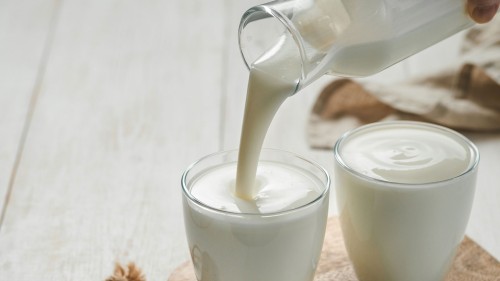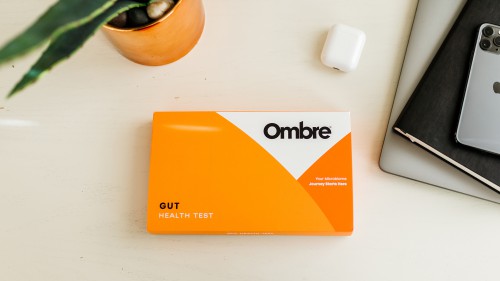10 Proven Ways to Stop Bloating, Plus When to Seek Help
Published on June 7, 2022
Medically Reviewed by Natalie Olsen, MS, RDN
Bloating is an unpleasant symptom for most people. Cutting back on salt intake, eating smaller portions, and taking natural supplements are some things that may help with bloating relief.


Bloating is a common digestive symptom. If you are feeling bloated all the time, you may be eager to learn what relieves bloating fast.
The good news is that there are many things you can do to experience bloating relief.
Keep reading to learn more about what bloating is, how to get rid of bloating, and when you should see a doctor.
What Is Bloating?
Bloating is made up of a set of symptoms. These may include gas, abdominal pressure, and unusual levels of fullness caused by this pressure and gas.
Other symptoms, such as burping and abdominal pain, sometimes also accompany bloating.
While some people feel bloated after eating a large meal, bloating is more than just being full. It is possible to feel bloated even with an empty stomach.
Abdominal bloating is amongst the most commonly reported negative symptom that occurs in the digestive tract. (1)
It is estimated that between 10% and 25% of healthy people experience occasional bloating. As many as 75% of those people describe bloating as moderate to severe, and about 10% experience it regularly. (2)
Bloating relief can look like different things for different people. Here are some tips to try if you experience chronic or even just occasional bloating:
1. Figure Out Its Root Cause
Bloating can be caused by many different things. The first step in treating bloating is finding out what may be causing it in the first place. Some of these causes may be things like:
- Food intolerances or sensitivities.
- Having imbalanced gut bacteria.
- Changes to the anatomy of the digestive tract. (3)
Getting tested can be a good way to find out the root cause of your bloating. Things such as stool tests and food sensitivity testing can help identify if you have any abnormalities that could be contributing to bloating.
Keeping a food diary can also help identify possible food triggers of foods your body may be extra sensitive to.
Summary
Finding out the root cause of bloating is the first step to trying to get bloating relief. Things such as food sensitivity testing and stool sample testing are two tests that can help identify a possible root cause. Keeping a food diary can be another helpful practice.
Dig Deeper: Why Am I Bloated All The Time?
2. Cut Back on Your Salt Intake
Salt causes the body to hold onto water. (4)
Research has shown that diets higher in sodium (salt) increase the likelihood of bloating. (5)
Therefore, cutting back on salt intake is one natural way to help relieve bloating.
Salty foods include things like:
- Highly processed meats such as bacon, hot dogs, and sausage
- Chips and pretzels
- Many condiments, including soy sauce, ketchup, and mustard
- Ready-to-eat convenience foods
- Frozen meals from a grocery store
- Most restaurant foods, especially pizza, burgers, and Asian-style foods
Adding salt to your own foods will also increase the amount of salt you eat. It can be helpful to gradually cut back on the amount of salt you use at home or in restaurants.
In addition, try eating fresher, less processed foods to cut down on salt intake.
Summary
Salt increases the body's water and can contribute to bloating. Cutting back on salty foods such as chips, processed meats, and convenience foods can help reduce the amount of salt you eat. Eating fresher foods can also help.
3. Modify Your Fiber Intake
Constipation is a common cause of bloating. (6).
Diets low in fiber can contribute to constipation. This is because fiber adds bulk to the stool and helps them pass more easily. (7)
However, in some cases eating too much fiber can also contribute to constipation. It depends on the type and amount of fiber you consume in one sitting, how much fluid and exercise you get, and how sensitive your body is. (8)
Therefore, either lowering or increasing the amount of fiber you eat may help.
However, a low fiber intake over a long period of time can cause more harm than good and is linked to a higher risk of death. (9)
It is best to get at least 25 grams for women and 38 grams of fiber for men daily. (10)
Consuming smaller amounts of high-fiber foods in one sitting may help decrease any negative symptoms you feel but still help you reach your fiber goal.
To determine whether you may be sensitive to fiber, it can be helpful to start by evaluating your current diet and the amounts of higher-fiber foods you are eating at one time.
For example, you may be able to tolerate 1/4 cup of beans with no symptoms and can work your way up to more as your body has to get used to a fiber-rich diet.
Examples of high fiber foods include:
- Whole grains (such as oatmeal, brown rice, and whole wheat bread products)
- Nuts and seeds, including products made from them
- Fruits and vegetables
- Beans and lentils
For some people, these foods can be gas-producing and contribute to bloating. This is why it is important to pay attention to foods that might be triggering to you, and to modify your intake as necessary.
It is still best to consume the recommended amounts of daily fiber, but adjust the amount per meal if you feel symptomatic.
If you suspect you are eating too much fiber, you may consider gradually cutting back in one meal, but still try to get the recommended amount in a day.
If you think you are not eating enough fiber, it may be helpful to gradually start eating more. Be sure to drink enough fluids and be physically active to further support normal bowel movements.
Work with a dietitian to help navigate how to get enough fiber but also mitigate any symptoms you may have.
Summary
Diets both too high and too low in fiber can contribute to constipation, which is a common cause of bloating. You may need to cut back or increase the amount of fiber you eat depending on what your normal diet currently includes. It is still best to consume the recommended daily amounts of fiber to improve long-term health.
4. Avoid Consuming Things That Make You Swallow Excess Air
Having excess air in the stomach area is a common symptom of bloating.
Some habits, including chewing gum and drinking carbonated beverages, can cause you to unintentionally swallow even more air. This can potentially make bloating worse. (11)
Tips that can help reduce the amount of air you swallow include:
- Avoid chewing gum.
- Avoid drinking through a straw.
- Drink non-carbonated beverages.
- Chew your food thoroughly.
- Eat slower.
Summary
Habits such as chewing gum and drinking carbonated beverages can increase the amount of air you swallow. This can make bloating worse for some people. Drinking non-carbonated beverages, eating slower, and avoiding gum are some things that can help minimize the amount of air you swallow.
5. Take Natural Supplements
There are many supplements that have the potential to provide bloating relief. Here are a few that may help:
Ginger
Ginger has been studied and has become well-known for its ability to soothe the stomach. This can benefit overall digestion.
Research has shown ginger can help with things such as nausea, gas, and bloating. (12)
In addition to taking ginger supplements, you can consume it in teas and use it fresh or dried in cooking.
Peppermint Oil
Peppermint soothes the gut and helps relax the muscles that allow you to pass gas. This can help remove excess air and possibly help with bloating. (13)
Research has shown that taking peppermint oil supplements is an effective short-term treatment for irritable bowel syndrome (IBS). (14)
Bloating is a common symptom of IBS.
Digestive Enzymes
Digestive enzymes can help with the proper breakdown and digestion of food after eating.
Your body naturally makes enzymes such as amylase, protease, and lipase. These help digest proteins, carbs, and fats.
Some people’s bodies don’t make enough. This can contribute to bloating. (15)
Therefore, taking digestive enzyme supplements may help with bloating relief.
Summary
Supplements including ginger, peppermint oil, and digestive enzymes may help with bloating relief. They do this by soothing the gut and supporting the proper digestion of food.
6. Try a Low-FODMAP Diet
FODMAP refers to a particular class of carbohydrates. It is an acronym that stands for fermentable, oligosaccharides, disaccharides, monosaccharides, and polyols.
Eating FODMAP foods pulls water into your intestines. (16)
The food is then fermented by bacteria in your gut. This can lead to symptoms such as bloating, gas, constipation, and diarrhea for sensitive people. (17)
Research has strongly supported the use of a temporary (4–6 weeks) low FODMAP diet for people with IBS. (18, 17)
This diet would restrict many foods such as apples, broccoli, dairy products, honey, and beans.
To learn more about FODMAPS and how to follow a low-FODMAP diet, check out this article.
Summary
FODMAPs are types of carbohydrates found in many common foods. They are rapidly fermented and may contribute to bloating for sensitive people. Following a temporary low-FODMAP diet may help relieve bloating.
7. Increase Your Probiotic Intake
Probiotics are live microorganisms that have health benefits after consumption. (19)
They are naturally found in fermented foods such as sauerkraut, miso, kimchi, kombucha, and some yogurts. They can also be taken in supplement form, which usually provides a higher dose.
Research has shown that some probiotics can help relieve bloating in people with IBS. (20)
This is because probiotics help your body maintain or achieve a healthy community of microorganisms like bacteria. This supports a healthy microbiome, which can support normal digestion. (21)
Not all probiotic supplements are the same, and not all strains of probiotic bacteria can help with bloating.
The research is still emerging, but one study showed that the probiotic strain Bifidobacterium lactis or infantis may help with bloating. (20)
To learn more about the best probiotic supplements and their uses, check out this article.
Summary
Probiotics are beneficial bacteria that support a healthy microbiome. This can also support proper digestion. Research shows that some probiotic supplements can help relieve bloating in people with IBS.
8. Eat Smaller Portions
Starting with large portions can lead to overeating. This can cause your stomach to stretch and feel tight, which may trigger bloating.
Eating too much can cause water retention or gas, depending on what the meal contains.
This is why starting with smaller portions of food may help prevent bloating for some people. Reducing your portion size and taking more food only as needed is a simple way to possibly prevent bloating.
Summary
Overeating can cause your stomach to stretch and feel tight. This can trigger bloating. Eating smaller portions is a simple way to help prevent bloating for some people.
9. Practice Mindful Eating
Mindful eating is not a diet but instead focuses on how you eat.
It involves paying more attention to your food, and slowing down and being present during meal and snack time.
It also involves being in touch with your hunger and fullness cues to guide you on when to start and stop eating. (22)
Studies have shown that mindful eating can help improve digestion. This may include bloating.(23)
It does this by helping to reduce stress on the body. According to the American Psychological Association, stress can negatively affect digestion and increase gas production. (24)
Therefore, practices such as chewing your food more thoroughly and eating without distractions may improve or help prevent bloating.
Summary
Mindful eating is a way of eating that helps reduce stress. Since stress can interfere with digestion, mindful eating may improve or help prevent bloating.
Related: Intuitive Eating: A Detailed Beginner’s Guide
10. Be Physically Active
Physical activity helps move food down the digestive tract. Some types of activity can help stretch your intestines. Others can help relieve trapped gas.
A recent study showed that physical activity could be effective in providing bloating relief. A combination of cardio and stretching activities can both help get rid of bloating. (25)
It may be even more effective shortly after eating a meal. This may look like going for a walk after dinner or doing yoga before or after breakfast. (26)
Whatever you do, some physical activity is better than none.
Summary
Physical activity can help relieve trapped gas and improve digestion. It can be effective in providing bloating relief. Both cardio and stretching exercises can help with bloating, and some is always better than none.
Dig Deeper: How to Start Exercising
When Will Your Bloating Go Away?
The time it takes to get rid of your bloating can vary. It depends on the cause and method of treatment.
Some types of bloating can be relieved within minutes or hours. Others can take a week or more to see results.
If you try many of the above tips and still do not find relief after a couple of weeks, it could mean that a larger issue is present.
When Should You See a Doctor?
Bloating can be a sign of a more serious underlying disorder. For example, liver disease, inflammatory bowel disease, and some types of cancer may cause bloating. (2)
If you experience chronic bloating that isn’t able to be consistently relieved by any of the above tips, you should make an appointment with your doctor right away.
In addition, if your bloating is paired with other symptoms, such as blood in the stool, difficulty eating, vomiting, or weight changes, seek medical advice as soon as possible.
This applies even if the bloating is only short-term.
The Bottom Line
Bloating is unpleasant for most people. It can involve feelings of abdominal pressure, gas, and tightness.
The good news is that there are many proven ways to stop bloating. These include:
- Figuring out its root cause.
- Modifying your fiber intake.
- Being more physically active.
- Eating smaller portions.
- Taking probiotics and other natural supplements.
- Cutting back on salt intake.
- Trying out a low-FODMAP diet.
The time it takes to experience bloating relief varies.
If you experience chronic bloating that isn’t relieved after a couple of weeks, even after trying these tips, you should see a doctor. Sometimes bloating is caused by a more serious issue that is important to identify soon.
At WellnessVerge, we only use reputable sources, including peer-reviewed medical journals and well-respected academic institutions.
- Management of Chronic Abdominal Distension and Bloating - PubMed:
https://pubmed.ncbi.nlm.nih.gov/32246999/ - Bloated Stomach: Causes, Tips to Reduce & When to be Concerned:
https://my.clevelandclinic.org/health/symptoms/21740-bloated-stomach - Belching, Bloating, and Flatulence - American College of Gastroenterology:
https://gi.org/topics/belching-bloating-and-flatulence/ - Salt and Water Retention - Action on Salt:
https://www.actiononsalt.org.uk/salthealth/salt-and-water-retention/ - Effects of the DASH Diet and Sodium Intake on Bloating: Results From the DASH–Sodium Trial - PMC:
https://www.ncbi.nlm.nih.gov/pmc/articles/PMC7122060/ - Bloating: Causes and Prevention Tips | Johns Hopkins Medicine:
https://www.hopkinsmedicine.org/health/wellness-and-prevention/bloating-causes-and-prevention-tips - Low Fiber Diet:
https://www.sciencedirect.com/topics/medicine-and-dentistry/low-fiber-diet - Stopping or reducing dietary fiber intake reduces constipation and its associated symptoms - PMC:
https://www.ncbi.nlm.nih.gov/pmc/articles/PMC3435786/ - Association between dietary fiber and lower risk of all-cause mortality: a meta-analysis of cohort studies - PubMed:
https://pubmed.ncbi.nlm.nih.gov/25552267/ - High-fiber foods - Mayo Clinic:
https://www.mayoclinic.org/healthy-lifestyle/nutrition-and-healthy-eating/in-depth/high-fiber-foods/art-20050948 - Swallowed Air:
https://healthy.kaiserpermanente.org/health-wellness/health-encyclopedia/he.swallowed-air.tm6320 - Ginger in gastrointestinal disorders: A systematic review of clinical trials - PMC:
https://www.ncbi.nlm.nih.gov/pmc/articles/PMC6341159/ - Peppermint Information | Mount Sinai - New York:
https://www.mountsinai.org/health-library/herb/peppermint#:~:text=Menthol%20and%20methyl%20salicylate%2C%20the,indigestion%20and%20irritable%20bowel%20syndrome. - A Novel Delivery System of Peppermint Oil Is an Effective Therapy for Irritable Bowel Syndrome Symptoms - PubMed:
https://pubmed.ncbi.nlm.nih.gov/26319955/ - Digestive Enzymes and Digestive Enzyme Supplements | Johns Hopkins Medicine:
https://www.hopkinsmedicine.org/health/wellness-and-prevention/digestive-enzymes-and-digestive-enzyme-supplements - Dietary poorly absorbed, short-chain carbohydrates increase delivery of water and fermentable substrates to the proximal colon - PubMed:
https://pubmed.ncbi.nlm.nih.gov/20102355/ - Low-FODMAP Diet - StatPearls - NCBI Bookshelf:
https://www.ncbi.nlm.nih.gov/books/NBK562224/ - Efficacy of the low FODMAP diet for treating irritable bowel syndrome: the evidence to date - PMC:
https://www.ncbi.nlm.nih.gov/pmc/articles/PMC4918736/ - Probiotics: What You Need To Know:
https://www.nccih.nih.gov/health/probiotics-what-you-need-to-know - Systematic review: probiotics in the management of lower gastrointestinal symptoms – an updated evidence‐based international consensus - PMC:
https://www.ncbi.nlm.nih.gov/pmc/articles/PMC5900870/ - Role of the gut microbiota in nutrition and health | The BMJ:
https://www.bmj.com/content/361/bmj.k2179 - Mindful Eating: The Art of Presence While You Eat - PMC:
https://www.ncbi.nlm.nih.gov/pmc/articles/PMC5556586/ - Mindful Eating: A Review Of How The Stress-Digestion-Mindfulness Triad May Modulate And Improve Gastrointestinal And Digestive Function - PMC:
https://www.ncbi.nlm.nih.gov/pmc/articles/PMC7219460/ - Stress effects on the body:
https://www.apa.org/topics/stress/body#:~:text=Stress%20can%20affect%20digestion%20and,bacteria%20to%20enter%20the%20body. - The effect of a short-term physical activity after meals on gastrointestinal symptoms in individuals with functional abdominal bloating: a randomized clinical trial - PubMed:
https://pubmed.ncbi.nlm.nih.gov/33868611/ - The effect of a short-term physical activity after meals on gastrointestinal symptoms in individuals with functional abdominal bloating: a randomized clinical trial - PMC:
https://www.ncbi.nlm.nih.gov/pmc/articles/PMC8035544/






